|
|
Grade Groups & Potential Assignments
Grade Groups can be used to calculate registration grades based on the student's number of visits, total time, and/or completed assignments. You can control which of those data points applies to this calculation, how many points are awarded, and the threshold of total points required to achieve a certain grade.
This feature is primarily utilized in fitness centers, but there's nothing preventing this from also being used in centers of other types if you think in might be applicable for your use case.
1. Creating a Grade GroupThe first step is creating a Grade Group. This is where you'll define how many points students will receive per action. To begin creating a Grade Group, go to Other > Other Options > Grade Groups. From the Grade Group Listing, click on the hamburger icon (File:Hamburger.png) and choose New Grade Group.
Screenshot: The Grade Group Entry page.
To begin, we need to decide what qualifies as the highest grade score. Let's say we have a 6 week course, and we want students visiting twice a week for an hour each time. Students will also be expected to complete one assignment per week.

- This is the name of this particular Grade Group.
- This determines how many points the student will receive per visit login. In some cases, you only want to reward total time rather than total logins, or both, or even neither. If you want to exclude this, simply leave the value as 0. In our case, we don't want students to visit for several hours at once, so we'll reward students who stagger out their 1-hour visits by providing points for separate visits.
- Similar to the above, we can reward points for visit time. In our case, we want to reward time more than login, so we'll say that the student gets 60 points per hour. Set to 0 to exclude.
- This ties into the Grade Tables below. Min Points means that the grade will only be as high as the student's minimum score across Visits, Time, and Assignments, while Combined Total combines the points from each of the three categories and calculates grade based off that number alone.
- Maximum Visit/Time/Assignment Points
- This allows you to designate a point threshold where a certain action no longer contributes to the student's overall total. For example, we may not want to give a student an A grade if they completed twice the Assignments as expected while they never visited the center. So we're capping the Assignment points at 800, and if the student wants to progress further than 800, they must visit the center.
- Minimum Visit Time to Count
- This allows you to add a visit time threshold for when a visit counts towards a student's total points. For example, you likely don't want a 5-minute visit to count towards their total. In our example case, the minimum is 20 minutes.
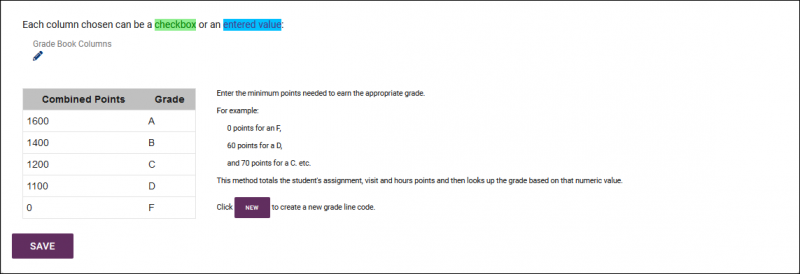
- These are the possible assignments that can contribute to a student's grade, which we will come back to in Step 2. Each assignment can be set to Checkbox or Entered Value depending on how you are tracking points.
- This is where you will define how many points are needed for each grade. This changes depending on whether you're using Combined Total or Min Points as the Calculation Mode.
- Combined Total: In this case, it's as simple as clicking the New button, and adding grades and their respective minimum points to obtain. In our example scenario, if a student visits 6 times, for exactly 60 minutes each, and completes all 6 assignments, the total is 1680 (of the 2100 theoretical maximum). We'll set our A grade a little under that score at 1600, with the rest of the grades being scaled accordingly. F grade is anything between 0 and the second lowest grade.
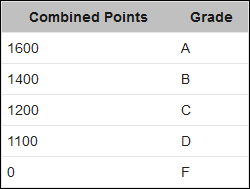
- Min Points: This use-case gets slightly more complicated, but gives greater flexibility in preventing students from over-scoring in visit time, while ignoring assignments, or vise-versa. With this option, we can create a grade level for each possible source of points, and the student's final grade will be the lowest of the set. As an example, lets say our student has maxed out the Visit and Time values, for a total of 1300pts, but they've only scored 400 in their Assignments (bringing the total to 1700). This would result in an A grade if the above Combined Total table was being used. If we want to discourage this approach, we can setup a table like we see below. The student's lowest grade in each column will be their final grade. Our example student would receive a C in this case.
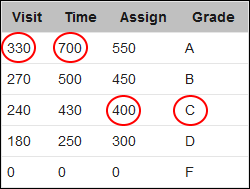
2. Creating a Potential AssignmentPotential Assignments are another way that students can gain points towards their grade. These assignments are linked to a Grade Group from the Grade Book Column option mentioned above, and will also need to be assigned to Section and Registration records, Step 3 and 4/5 respectively. To create a new Potential Assignment, go to Other > Other Options > Potential Assignments > Click the hamburger icon (File:Hamburger.png) > New Potential Assignment.
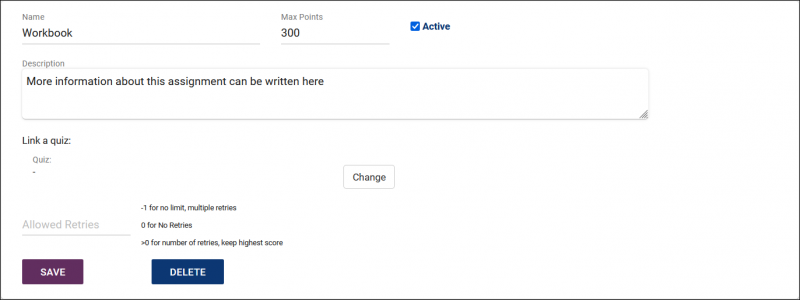
- This is the name of this assignment.
- This is the number of points that can be contributed to a student's overall grade.
- This is your description of this assignment.
- Link a quiz and Allowed Retries
- This ties into SurveyTrac's ability to send students a quiz. More information on this in Step 6.
3. Linking Grade Groups to SectionsTo utilize the Assignment Grid (Step 5), the Grade Group must be linked with your section record. In the example below, I'm linking ACTG100 004 with Wiki Grade Group. Other > Listings > Sections > [The section record you want to update] > Grade Group.

4. Linking Assignments to Individual RegistrationsNow that you have your Potential Assignments and Grade Groups setup, you can link an assignment to your student registrations. This can performed in bulk from the Assignment Grid (Step 5) or individually.
For the latter scenario, this is done by going to Students > [Your student] > Registrations > [The registration you want to link an assignment to] > Assignments. Click the Add New Assignment button, which will take you to the following screen.
Alternate methods of reaching a Registration record, such as through Listings > Registrations, are also available.
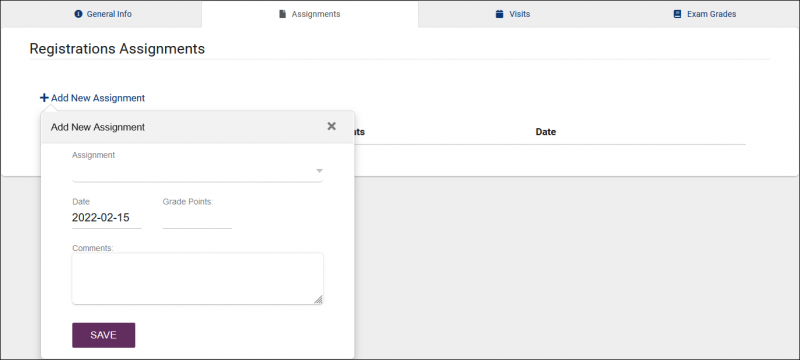
- Select your Potential Assignment type here.
- Date of assignment creation.
- Define how many points the student received for this assignment (overrides maximum points defined in Potential Assignment).
- An optional field for additional comments.
5. Assignment Grid on Registration ListingThe Assignment Grid allows you to review your students' total points, as well as mark assignments as completed for multiple students at once. This menu can be accessed by going to Other > Listings > Registrations > Hamburger icon (File:Hamburger.png) > Views > Assignment Grid.
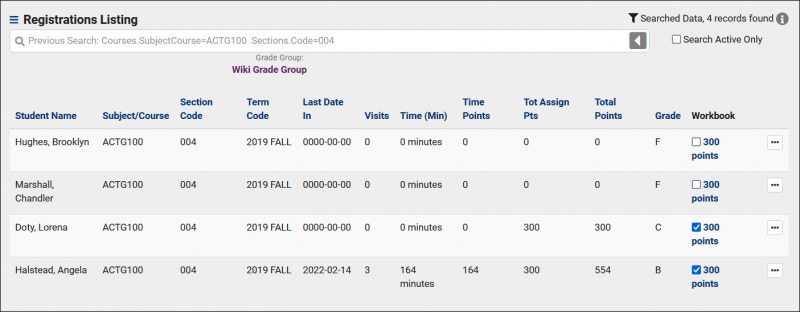
There are several actions that can take place from this screen, alongside the basics such as reviewing individual grades and points.
- If you've made an adjustment to your grading algorithm, or recently recorded new visits for a student, you may need to recalculate grades to see the most up-to-date information. From the Assignment Grid, click on the Hamburger icon (File:Hamburger.png), then Recalc These Grades. The screen will refresh with updated information after a moment of loading.
- Mark Assignments as Completed (Checkbox)
- Any Potential Assignments linked to your Grade Group will appear as an additional column on this screen. The screenshot above displays this for our Workbook assignment. Simply click the checkbox to mark the assignment as completed, updating the student's total points.
- Assign a Value to Assignments (Entered Value)
- In your Grade Group settings, if you opted to mark assignments as "Entered Value" instead of "Checkbox," you will see a slightly different view. Here, you can instead enter custom point values for this assignment on a per-student basis. Click the + icon to add points to the total, click - to subtract.
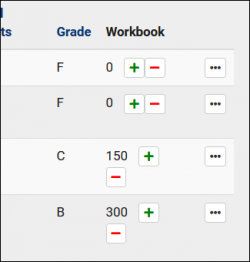
- If you would like to export this grade data to a CSV file, there's a utility immediately available from the Assignment Grid view in Hamburger icon > Export CSV.

6. SurveyTrac QuizzesThe assignment functionality can be further expanded via use of the SurveyTrac module. This allows you to send quizzes to students, and the results of those quizzes can be used to calculate their grade.
This portion of the article will only be covering the functionality unique to Grade Groups and Assignments. For information on general SurveyTrac functionality, click here to be taken to that wiki page.
- Assignment-Specific Survey Settings
- After creating a Survey as usual, you will then need to mark it as a Quiz. This is found under the Options tab in your survey settings.
 - * Correct / Incorrect Answer Feedback
- This text is displayed upon
Linking to Assignment
Sending a Quiz
|










